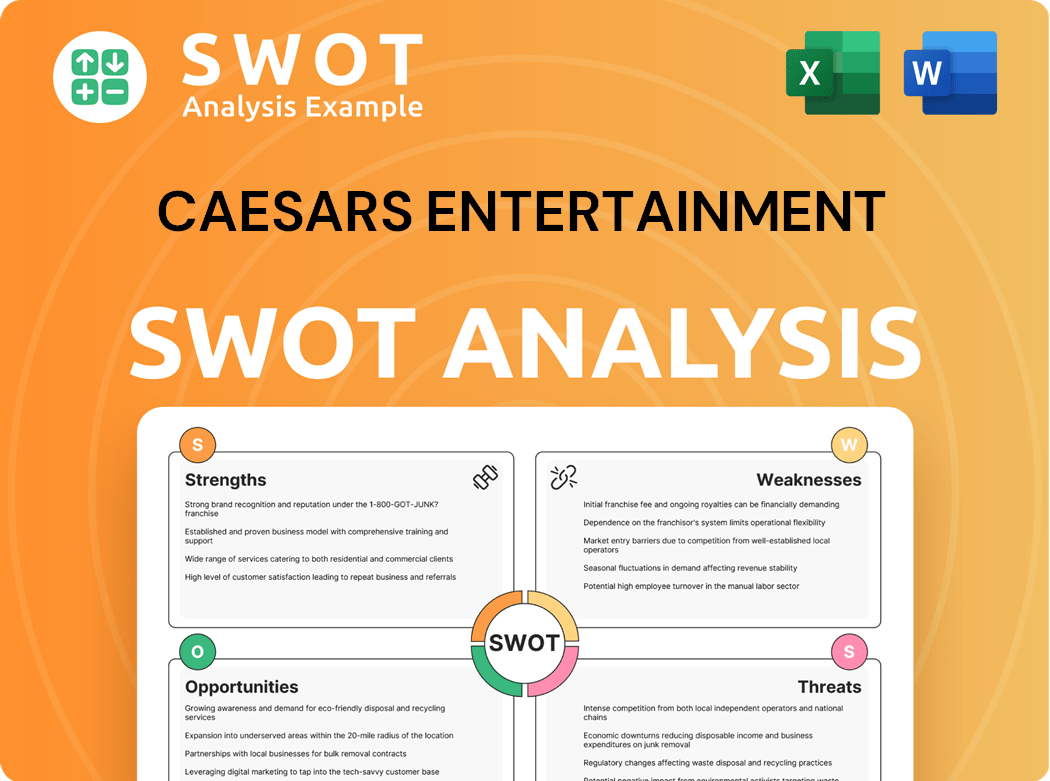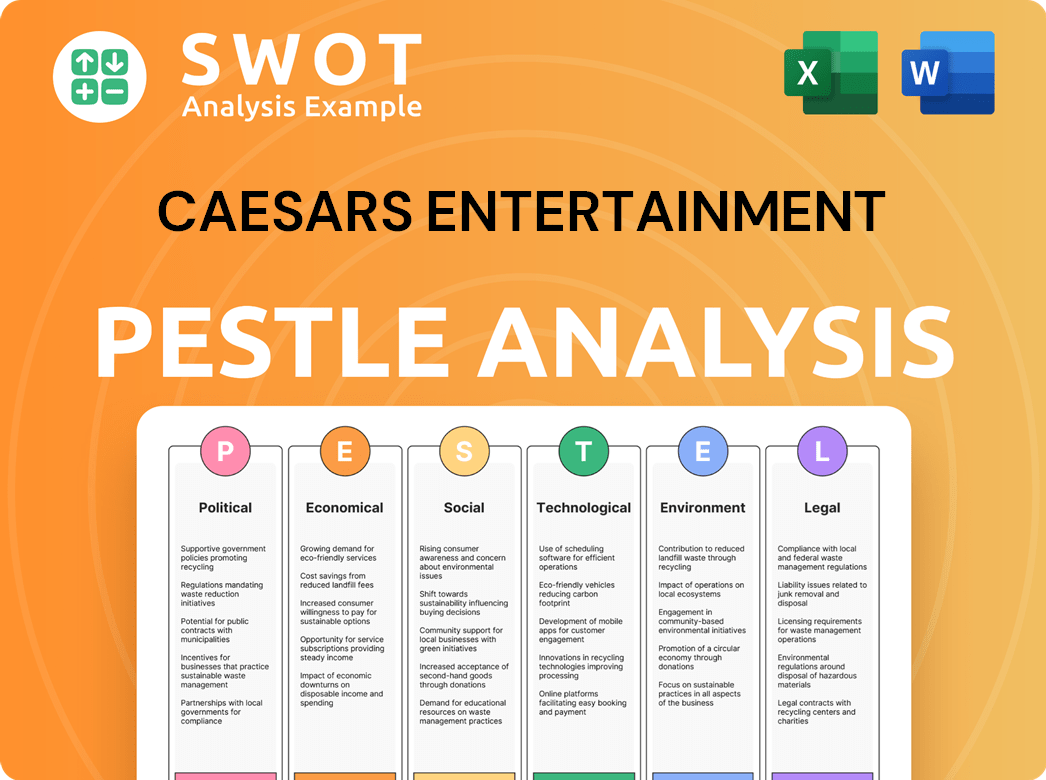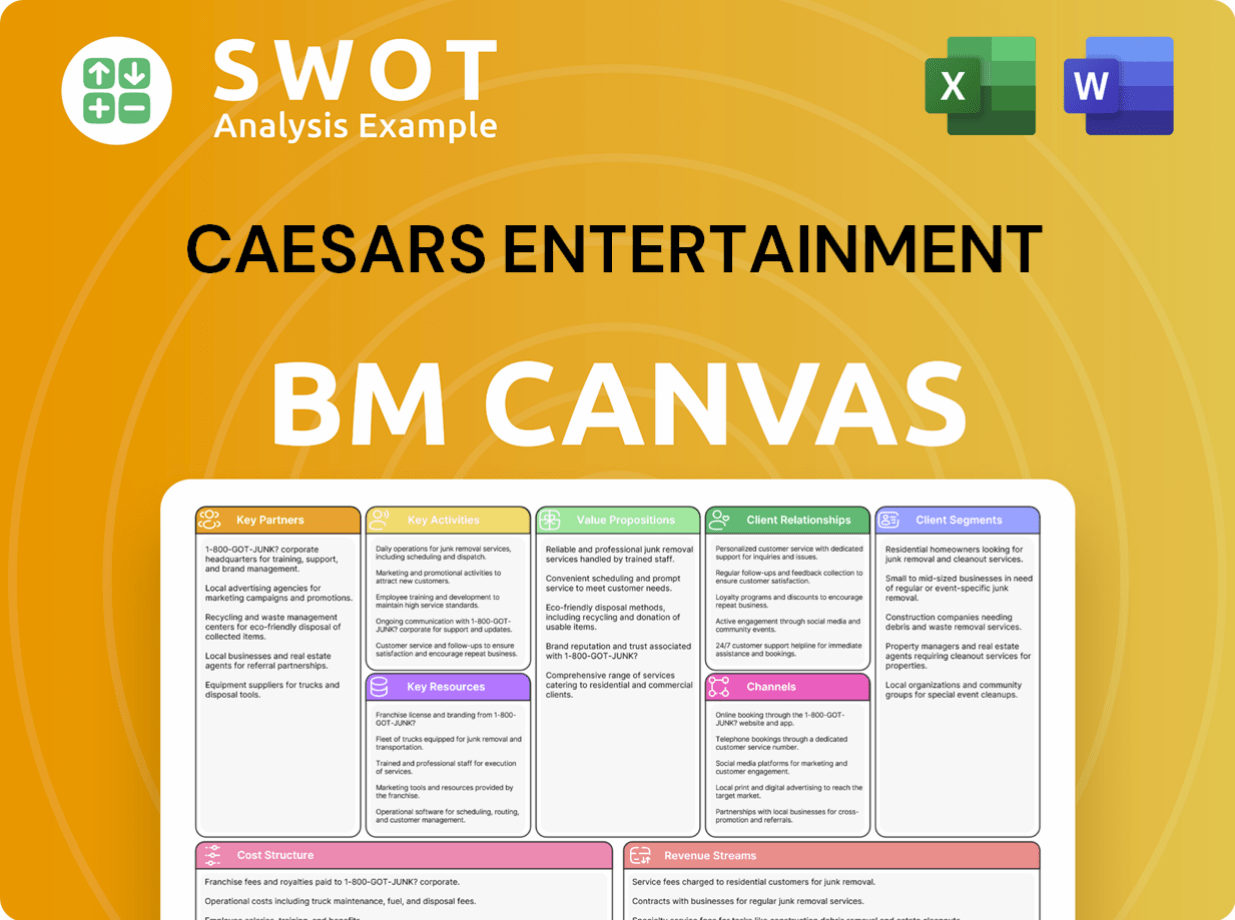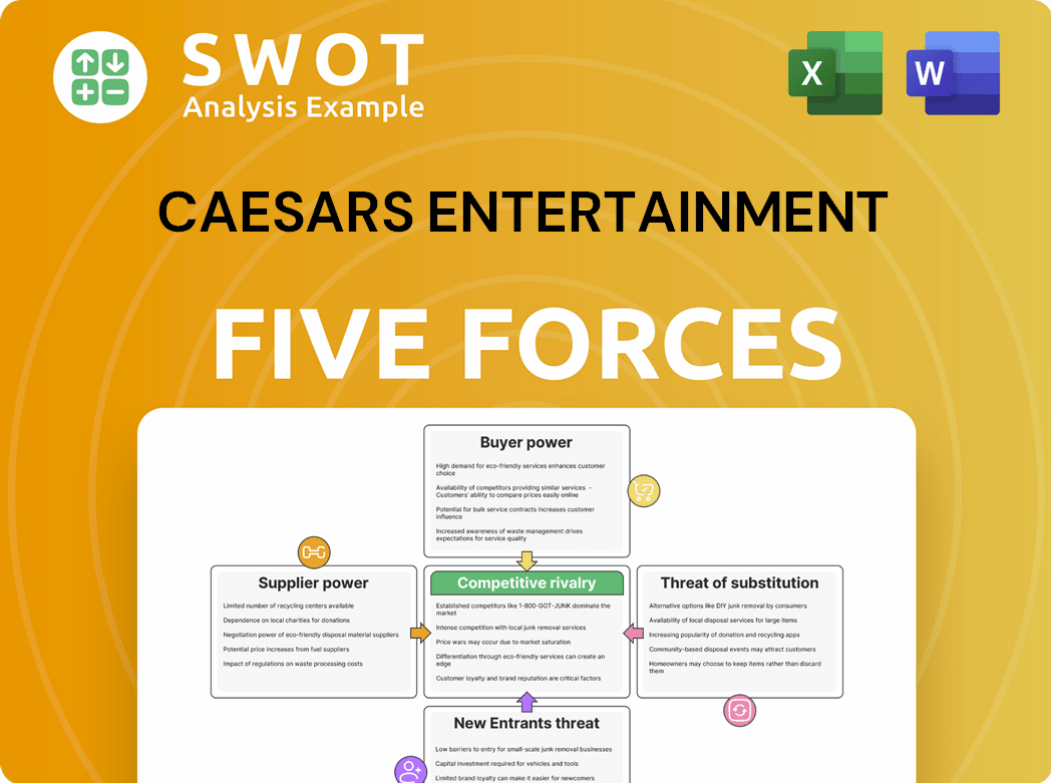Caesars Entertainment Bundle
How did Caesars Entertainment conquer the casino world?
Journey back in time to explore the captivating Caesars Entertainment SWOT Analysis and the rise of a gaming behemoth. From its humble beginnings in the heart of Las Vegas, Caesars Entertainment has redefined luxury and entertainment. Discover how a single, ambitious vision blossomed into a global empire, shaping the landscape of the casino industry.

The Caesars Entertainment story is a compelling narrative of strategic expansion and adaptation within the dynamic casino industry. Understanding the Caesars history is crucial for investors and analysts alike, offering insights into market trends, competitive strategies, and the evolution of Caesars company. From the early years of Caesars Palace to the present day, explore the milestones, mergers (including Harrah's Entertainment), and acquisitions that have defined this iconic brand and its impact on Las Vegas casinos.
What is the Caesars Entertainment Founding Story?
The story of Caesars Entertainment begins with a vision of opulence and a desire to redefine the Las Vegas experience. Founded by Jay Sarno, Caesars Palace officially opened its doors on August 5, 1966. Sarno, a motel owner, aimed to create a Roman-themed resort that would transport guests to a world of luxury, setting a new standard for the casino industry.
Sarno's vision was to offer a comprehensive luxury resort experience, with gaming as a key component, but not the sole focus. The resort's design, with its elaborate Roman architecture, fountains, and statues, was intended to immerse guests in the grandeur of the ancient Roman Empire. This innovative approach set Caesars Palace apart from other Las Vegas casinos at the time.
Sarno's entrepreneurial spirit was evident in his securing of initial funding, combining personal wealth and loans to bring his ambitious project to life. The name 'Caesars Palace' reflects Sarno's intention to make every guest feel like a Caesar, emphasizing the resort's commitment to luxury and exclusivity. The cultural context of the 1960s, with a growing interest in extravagant leisure, provided the perfect environment for Sarno's venture. This marked the beginning of what would become a significant player in the Caesars history.
Caesars Entertainment SWOT Analysis
- Complete SWOT Breakdown
- Fully Customizable
- Editable in Excel & Word
- Professional Formatting
- Investor-Ready Format

What Drove the Early Growth of Caesars Entertainment?
The early years of Caesars Entertainment, following the debut of Caesars Palace, were marked by rapid growth and the establishment of its reputation as a premier destination. This period saw the company solidify its position in the Las Vegas casinos market, attracting a high-end clientele and top entertainers. A key turning point was the acquisition by Lum's restaurant chain in 1969, which provided the resources for significant expansion.
During the 1970s and 1980s, Caesars Entertainment, then known as Caesars World, expanded strategically. This included acquiring properties in key gaming markets like Caesars Tahoe and Caesars Atlantic City. These moves were crucial for diversifying revenue streams and establishing a national presence, influencing the casino industry.
The market generally responded positively to Caesars' luxury gaming and entertainment offerings, enabling it to thrive in a competitive environment. Leadership changes occurred during this time, guiding the company through periods of both success and challenges. The company's focus shifted towards integrated resorts, offering a wider range of amenities.
The company's growth strategy included developing larger, integrated resorts. These resorts provided more than just gaming, including expanded hotel capacity, diverse dining options, and retail spaces. This anticipated the trend toward resort-style entertainment complexes, enhancing the overall guest experience and increasing revenue potential.
While specific financial figures from the 1970s and 1980s are not readily available, the expansion into new markets and the addition of amenities suggest a focus on increasing revenue. The company's ability to acquire properties and develop integrated resorts indicates a strong financial position during this period, setting the stage for future growth. The company's early success laid the groundwork for its later merger with Harrah's Entertainment.
Caesars Entertainment PESTLE Analysis
- Covers All 6 PESTLE Categories
- No Research Needed – Save Hours of Work
- Built by Experts, Trusted by Consultants
- Instant Download, Ready to Use
- 100% Editable, Fully Customizable

What are the key Milestones in Caesars Entertainment history?
The Caesars Entertainment has a rich Caesars history marked by significant milestones in the casino industry. From its inception, the company has expanded and adapted, becoming a major player in the Las Vegas casinos scene and beyond.
| Year | Milestone |
|---|---|
| 1937 | William F. Harrah opens a bingo parlor in Reno, Nevada, marking the early beginnings of what would become Harrah's Entertainment. |
| 1979 | Caesars Company, the parent company of Caesars Palace, goes public. |
| 1997 | Caesars Entertainment introduces the Total Rewards loyalty program, a groundbreaking innovation in customer relationship management. |
| 2004 | Harrah's Entertainment acquires Caesars Entertainment, creating a massive gaming and hospitality conglomerate. |
| 2015 | Caesars Entertainment files for bankruptcy, undergoing a major restructuring to address its debt. |
| 2017 | Caesars Entertainment emerges from bankruptcy, with a significantly reduced debt load and a renewed focus on core operations. |
| 2020 | Caesars Entertainment merges with Eldorado Resorts, Inc., creating the largest U.S. gaming company. |
| 2023 | Caesars Entertainment reports a net revenue of $11.6 billion, showcasing its strong financial performance. |
Caesars Entertainment has consistently introduced innovations to enhance guest experiences and streamline operations. The Total Rewards program, launched in 1997, set a new standard for loyalty programs in the casino industry. The company has also been at the forefront of integrating technology, particularly in online gaming and sports wagering.
This program, launched in 1997, was a groundbreaking initiative, offering tiered rewards and data-driven customer relationship management. It set a benchmark for the casino industry and beyond.
Caesars Entertainment has invested heavily in online platforms and sports betting, capitalizing on the expansion of regulated sports wagering across the United States. This has become a significant revenue stream.
The company has consistently integrated technology to improve the guest experience, including mobile apps, digital kiosks, and enhanced in-room technology. This helps in operational efficiency.
Caesars Entertainment has formed strategic alliances with various technology providers and sports organizations to enhance its offerings and reach a wider audience. These partnerships help in marketing.
The company uses data analytics to personalize guest experiences, optimize marketing campaigns, and improve operational efficiency. This improves customer satisfaction.
Caesars Entertainment has invested in mobile technology to enhance the guest experience, including mobile check-in, digital room keys, and mobile ordering. This improves convenience.
Caesars Entertainment has faced several significant challenges throughout its history. These include intense competition within the casino industry, economic downturns, and substantial debt burdens.
The Las Vegas casinos market, along with other markets, is highly competitive, requiring continuous innovation and marketing efforts to attract and retain customers. This impacts profitability.
Economic recessions and downturns, such as the 2008 financial crisis and the COVID-19 pandemic, have significantly impacted the company's financial performance. This impacts revenue.
The company has, at times, carried a substantial debt load, which has led to financial restructuring and strategic adjustments. This impacts the financial health.
Changes in gaming regulations and tax policies can impact the company's operations and profitability, requiring adaptation and compliance. This impacts the business model.
The COVID-19 pandemic caused temporary closures and operational adjustments, requiring the company to implement enhanced health and safety protocols. This impacts the operations.
Evolving consumer preferences and the rise of digital entertainment require the company to adapt its offerings and marketing strategies. This impacts the customer experience.
To learn more about the competitive landscape, consider exploring the competitive analysis of Caesars Entertainment.
Caesars Entertainment Business Model Canvas
- Complete 9-Block Business Model Canvas
- Effortlessly Communicate Your Business Strategy
- Investor-Ready BMC Format
- 100% Editable and Customizable
- Clear and Structured Layout

What is the Timeline of Key Events for Caesars Entertainment?
The history of Caesars Entertainment is marked by significant milestones and strategic shifts within the casino industry. From its inception in Las Vegas to its expansion across the United States and beyond, the company has navigated mergers, acquisitions, and financial challenges to become a leading force in the entertainment and hospitality sector. Understanding the evolution of Caesars Entertainment provides valuable insights into the dynamics of the casino industry and its adaptability to changing market conditions. This brief history of Caesars Palace and the broader company showcases its resilience and its ability to innovate and grow.
| Year | Key Event |
|---|---|
| 1966 | Caesars Palace, a landmark in Las Vegas casinos, opens its doors, setting a new standard for luxury and themed entertainment. |
| 1969 | Lum's acquires Caesars Palace, forming Caesars World, marking the beginning of corporate ownership and expansion. |
| 1979 | Caesars Atlantic City opens, signaling the company's strategic move into new markets beyond Las Vegas. |
| 1997 | The introduction of the Total Rewards loyalty program enhances customer engagement and drives repeat business. |
| 2005 | Harrah's Entertainment acquires Caesars Entertainment, integrating two major players in the casino industry. |
| 2010 | Harrah's Entertainment rebrands as Caesars Entertainment Corporation, reflecting a strategic realignment. |
| 2015 | Caesars Entertainment Operating Company (CEOC) files for bankruptcy, a significant financial challenge. |
| 2017 | CEOC emerges from bankruptcy, restructuring its financial obligations and setting the stage for future growth. |
| 2020 | Eldorado Resorts acquires Caesars Entertainment Corporation, creating the largest casino company in the U.S. and retaining the Caesars Entertainment, Inc. name, marking a major industry consolidation. |
| 2021 | Caesars Entertainment expands into digital markets, making significant investments in online sports betting and iGaming. |
| 2024 | Caesars Palace Dubai opens, signifying international expansion and diversification of the company's portfolio. |
| 2025 | Continued focus on digital growth and expansion of retail sportsbooks. |
Caesars Entertainment is heavily investing in its digital platforms, particularly in online sports betting and iGaming. The company aims to increase its market share in these rapidly growing segments. This strategic move is designed to capitalize on the increasing consumer preference for online entertainment and betting options. The focus on digital growth is a key part of Caesars Entertainment's growth strategy.
Caesars plans to expand its retail sportsbook locations across the United States. This expansion is driven by the increasing legalization of sports betting in various states. The company intends to create more integrated experiences by combining digital and physical offerings to cater to its customers. This multi-channel approach aims to improve customer engagement and revenue generation.
Caesars Entertainment will continue to invest in its physical properties, focusing on renovations and new amenities. The goal is to enhance the guest experience and attract a broader range of demographics. This includes upgrading existing facilities and introducing new entertainment options. These improvements aim to enhance the overall appeal of the properties.
The company is closely monitoring industry trends, such as the increasing legalization of sports betting. The growing demand for integrated resort experiences will significantly influence Caesars' future trajectory. Analyst predictions suggest continued growth in the digital segment. The physical properties will likely focus on maximizing profitability and experiential offerings.
Caesars Entertainment Porter's Five Forces Analysis
- Covers All 5 Competitive Forces in Detail
- Structured for Consultants, Students, and Founders
- 100% Editable in Microsoft Word & Excel
- Instant Digital Download – Use Immediately
- Compatible with Mac & PC – Fully Unlocked

Related Blogs
- What is Competitive Landscape of Caesars Entertainment Company?
- What is Growth Strategy and Future Prospects of Caesars Entertainment Company?
- How Does Caesars Entertainment Company Work?
- What is Sales and Marketing Strategy of Caesars Entertainment Company?
- What is Brief History of Caesars Entertainment Company?
- Who Owns Caesars Entertainment Company?
- What is Customer Demographics and Target Market of Caesars Entertainment Company?
Disclaimer
All information, articles, and product details provided on this website are for general informational and educational purposes only. We do not claim any ownership over, nor do we intend to infringe upon, any trademarks, copyrights, logos, brand names, or other intellectual property mentioned or depicted on this site. Such intellectual property remains the property of its respective owners, and any references here are made solely for identification or informational purposes, without implying any affiliation, endorsement, or partnership.
We make no representations or warranties, express or implied, regarding the accuracy, completeness, or suitability of any content or products presented. Nothing on this website should be construed as legal, tax, investment, financial, medical, or other professional advice. In addition, no part of this site—including articles or product references—constitutes a solicitation, recommendation, endorsement, advertisement, or offer to buy or sell any securities, franchises, or other financial instruments, particularly in jurisdictions where such activity would be unlawful.
All content is of a general nature and may not address the specific circumstances of any individual or entity. It is not a substitute for professional advice or services. Any actions you take based on the information provided here are strictly at your own risk. You accept full responsibility for any decisions or outcomes arising from your use of this website and agree to release us from any liability in connection with your use of, or reliance upon, the content or products found herein.